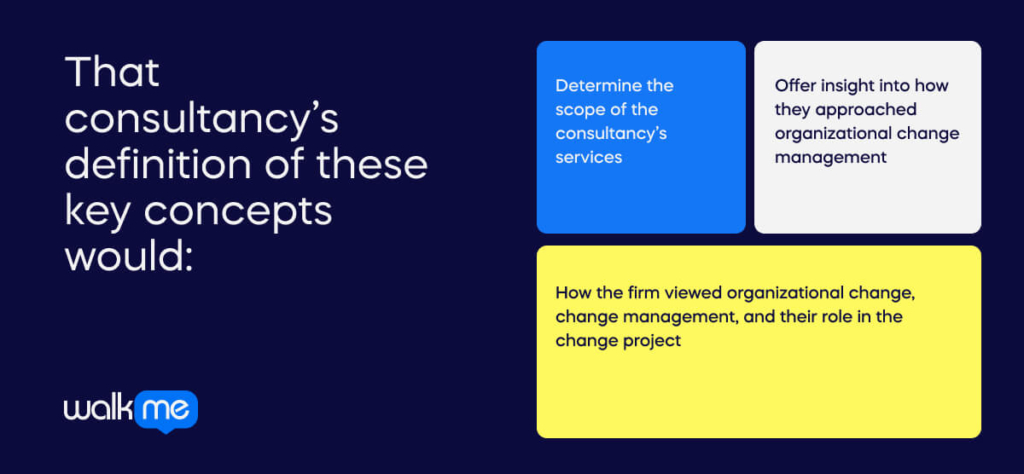An organizational change definition by authors and thought leaders can help us understand change, change management, and other change-related topics.
If you’re reading this blog post, chances are you have heard of:
- Organizational change
- Organizational change management
- Change management
- Change leadership
And similar terms.
These terms all have precise meanings – but unfortunately, the meaning can vary depending on who you ask.
There are no “globally recognized” definitions for these terms, in other words.
To truly understand the concepts, therefore, we should look to industry leaders and professionals.
Dictionaries, websites, and articles explain organizational change in a few ways:
- “Company or organization going through a transformation. Organization change occurs when business strategies or major sections of an organization are altered. Also known as reorganization, restructuring and turnaround.” –BusinessDictionary.com
- “A process in which a large company or organization changes its working methods or aims, for example in order to develop and deal with new situations or markets.” –Cambridge Dictionary
- “Organizational change occurs when a company makes a transition from its current state to some desired future state.” –Inc.com
These definitions seem to agree with one another, for the most part.
This overlap may offer some insight as to why so few authors go out of their way to offer “dictionary definitions” of organizational change.
After all, when everyone agrees on a definition, there is no need to offer an alternative.
However, things change when we begin discussing organizational change management.
Change management – also known as organizational change management (OCM) – is a business discipline dedicated to managing organizational changes.
When it comes to this term, there is more disagreement over the details.
Dictionary Definitions of Change Management
When it comes to change management, definitions are slightly more nuanced.
To start with, let’s see how dictionaries define change management:
- “The process of organizing change in a large organization in an effective way” –Cambridge Dictionary
- “Managing organizational change is the process of planning and implementing change in organizations in such a way as to minimize employee resistance and cost to the organization while simultaneously maximizing the effectiveness of the change effort.” –Inc.com
- “Change management (sometimes abbreviated as CM) is a collective term for all approaches to prepare, support, and help individuals, teams, and organizations in making organizational change.” –Wikipedia
- “Minimizing resistance to organizational change through involvement of key players and stakeholders.” –BusinessDictionary.com
However, these definitions are short and unsourced.
And – in the case of the last definition particularly – we could argue that these definitions are hardly complete.
So instead of relying on dictionaries for our definitions, we should look to industry authorities, authors, and thought leaders.
Here are some change management definitions that offer more depth:
- Prosci’s definition: “The process, tools, and techniques to manage the people side of change to achieve a required business outcome.”
- According to John Kotter’s consultancy, change management: “Refers to a set of basic tools or structures intended to keep any change effort under control. The goal is often to minimize the distractions and impacts of the change.”
- ACMP, the Association of Change Management Professionals, defines it this way: “The practice of applying a structured approach to transition an organization from a current state to a future state to achieve expected benefits.”
- Robert Schaffer points out that management and change management are strikingly similar: “When you think about it, all management is the management of change … the job of management always involves defining what changes need to be made and seeing that those changes take place.”
- According to a paper by Markus Wanner: “Change management is an organized, systematic application of the knowledge, tools, and resources of change that provides organizations with a key process to achieve their business strategy.”
Despite the nuanced differences above, we can see here that there is still a great deal of overlap.
But when it comes down to it – what’s the significance of these different definitions?
In other words…
Why Do These Definitions Matter for Your Business?
The most basic reason to have a definition is obvious – to understand the meaning of a term.
However, when different definitions are applied to the same term, each definition carries a different meaning.
For business professionals, these subtle differences can make big differences.
Imagine that a company is hiring a change management consultancy.
That consultancy’s definition of these key concepts would:

- Determine the scope of the consultancy’s services
- How the firm viewed organizational change, change management, and their role in the change project
- Offer insight into how they approached organizational change management
Two completely different agencies may have completely different approaches.
One approach may focus on a specific type of change, such as digital transformation or change at the individual level.
Another may use its own change management approach.
And so on.
Each approach would certainly affect the level of service, the quality, and the outcomes of these projects.
Any business undertaking an organizational change initiative should examine the issue closely.
As this scenario has illustrated, definitions directly impact how organizational changes are managed and executed.

